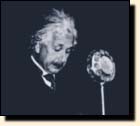|

In London, 1933. |
During a stay in England in September 1933, Einstein
met with Winston Churchill, Lloyd George, and prominent British
scientists and intellectuals. He tried to warn them of the
Nazi danger. Many noted academics were fleeing Germany, few
of them received abroad as warmly as Einstein. He worked on
behalf of the Emergency Committee to Aid Displaced German
Scholars and other organizations that tried to find homes
for both Jewish and political refugees. |

A Sample of Einstein's Public Activities: 1930-1935

|
- With Stefan Zweig, Bertrand Russell, and others, signs
petition favoring the Kellogg-Briand arms limitation pact.
- Appeals against conscription and military training of
young men; signs petition with Thomas Mann, Romain Rolland,
and others.
- Speaks at the New History Society, New York, translated
by the pacifist Rosika Schwimmer.
|

|
- Attends special screening in Hollywood of "All Quiet
on the Western Front," a film banned in Germany; supports
the German League for Human Rights campaign to have the
film shown in Germany.
- Speaks at the California Institute of Technology on
the social role of science.
- Addresses a peace group at Chicago railway station.
- Joins an international protest to save lives of eight
Scottsboro, Alabama blacks wrongly convicted of rape.
- Speaks at a mass protest meeting supporting E.J. Grumbel,
a liberal professor under attack in Germany.
- Supports the International Union of Anti-militarist
Clergymen and Ministers, who call for a Geneva peace conference.
- Speaks at a student meeting of League of The Nations
Association.
- Meets with War Resisters International; sends message
to their conference in France.
|

|
- Attends meeting of the Los Angeles University of International
Relations.
- Speaks to the Joint Peace Council, with Lord Ponsonby,
on the failure of disarmament conferences.
- Exchanges letters with Freud under auspices of International
Institute of Intellectual Cooperation, leading to publication
of pamphlet, "Why War?"
|

|
- Addresses student group at the California Institute
of Technology in Pasadena.
- Resigns from the Prussian and Bavarian Academies of
Science in protest after Hitler takes power; in open letter,
he denies the accusation that he spread propaganda on
anti-Semitic atrocities.
- Accepts election as a Founding Member, with Lord Davies,
of the New Commonwealth Society; discusses international
army and navy police force.
- Speaks at a mass meeting in London for the Refugee Assistance
Fund to aid victims of the Nazis.
- Guest of honor at the World Peaceways dinner in New
York.
|

|
- Speaks at a Princeton, New Jersey state conference on
Causes and Cures of War.
- Sends letter to the Anti-War Committee at New York University.
- Makes national radio speech on Brotherhood Day, sponsored
by National Conference of Christians and Jews.
- Sends message to the Educators and World Peace conference
of the Progressive Education Association in New York.
|

|
- With Alfred E. Smith, speaks on national radio and at
a New York dinner to aid political and non-Jewish refugees
from Germany.
- Helps to initiate campaign for a Nobel Peace Prize for
the pacifist Carl von Ossietzky, then ill in a German
concentration camp.
- With John Dewey and Alvin Johnson, becomes member of
the United States section of the International League
for Academic Freedom.
- Speaks at Passover celebration in at the Manhattan Opera
House, urging Jewish-Arab amity in Palestine.
|
|
|

